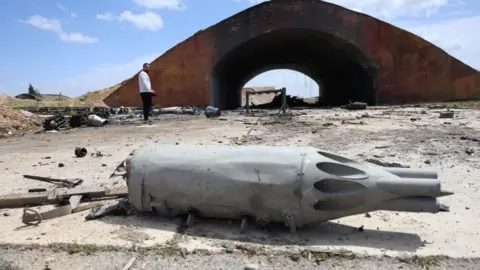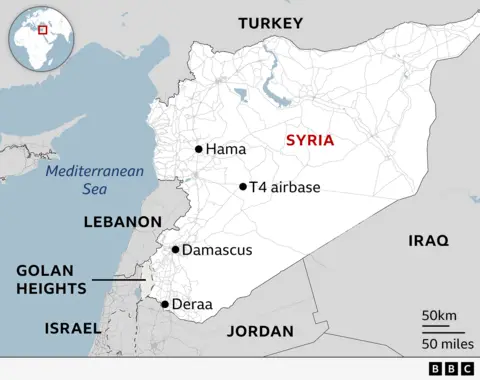Middle East Correspondent BBC
 EPA
EPAThe increasing confrontation between Israel and Turkey in Syria is a serious challenge to the fragile new government of Syria.
On Wednesday night, Israel bombed many military targets in Syria, including two airports – Hama Military Airport and T4 base near Homs.
The Syrian Ministry of Foreign Affairs said that the bombing destroyed the Hama base. A prominent group of the Syrian Human Rights Group said that four employees of the Ministry of Defense were killed, and ten other people were injured.
The air strikes hit SyriaBut their real goal was Türkiye.
Shortly later, the Israeli Foreign Minister accused Turkey of playing a “negative role” in Syria, and the Israeli Defense Minister of Syria, Ahmed Al -Shara, warned that he would “pay a very expensive price” if “hostile forces” allows his country to enter.
Ankara is currently negotiating a joint defensive agreement with the new SAR government, and there have been widely domain reports that Türkiye is moving to aircraft and air defense systems in Syria T4 and Aleppo Airbases.

Some analysts compared intensive air strikes in Israel at an important airport this week with lighter bombing on the edge of the T4 base, indicating that Türkiye has already transferred some equipment there And that Israel was calibrating its attack to avoid a complete escalation.
Relations between Israel and Turkey have been subjected to the Gaza war in October 2023, when Ankara has provided commercial restrictions and accusing Israel from genocide.
This regional tension now plays on a new land in Syria.
After the air strikes on Wednesday, the Ministry of Foreign Affairs in Türkiye accused Israel of destabilizing the region by “causing chaos and feeding terrorism” and said it is now the biggest threat to the security of the region.
But Foreign Minister Hakan Vian told Reuters news agency that his country is not seeking a confrontation with Israel, and that Syria could set its own policies with its southern neighbor.
The new leader of Syria has repeatedly indicated that he is not looking for a confrontation with Israel. Shortly after President Bashar al -Assad sweeping the authority last December, BBC told that Syria would not pose a threat to any country.
He left the door open to the normalization of diplomatic relations with Israel in the future, as the economist told last month that Syria wanted peace with all parties, but it is too early to discuss such a sensitive issue.
His maximum priority since taking power has been the unification of Syria bitterly divided, soothing external relations with its neighbors, while strengthening its strength and control.
But Israel did not make that easy. Its military interventions in Syria nourish the conflict with both external forces such as Türkiye, and with internal groups such as jihadists in the south of the country.
Israel was once an enemy that did not calm down for the former president in Syria and his Iranian ally, and he also doubts the Chari, a man who once led the Syrian branch of al -Qaeda, which was supported by his new government by Türkiye.
Since he took power, the Israeli army bombed Syrian arms stores, airports and other military sites that the previous regime left, to avoid their fall in the hands of the enemy, she says.
It also occupied a weapon buffer zone, which was established after the 1973 Arab -Israeli War, and sent forces to the Syrian side of a nearby mountain, where it established nine bases throughout the region.
The Israeli forces are also involving regularly in the southwestern provinces in Syria, which pledges to prevent any armed groups or government forces there.
Earlier this week, the local government in the southern city of Dera said that nine civilians were killed in Israeli bombing, during the deepest incursion there so far by the Israeli forces.
Four other people were killed in the Israeli bombing near the village of Koya late last month, after local militants tried to stop the progress of the Israeli forces there.
Since then, the mosques in both Dera and Damascus have called for jihad against the Israeli forces.
Charles Leicester, head of the Syria-based Middle East Institute at the Middle East Institute, who is studying the region, has calculated more than 70 terrestrial incursions in southwestern Syria since February, describing this as “a very dangerous-and unnecessary one.”
Since the fall of Assad four months ago, he says, no single attack has been targeted by Israel from Syria and the country's security forces have lived “at least 18 shipments of weapons destined for Hezbollah in Lebanon, and to dismantle at least eight sites to launch the missiles associated with Iran.”
 Reuters
ReutersMany Syrians are disappointed by Israel's response to their new government. They watched for years while Israel targeted the Assad regime, and they believed that the fall of Assad would lead to the opportunity to a less confrontation relationship with Israel.
Some say that this opinion is now changing.
“We are used to believe that the Israeli army was targeting only the forces of the Assad regime,” said Ismail, the owner of a restaurant in the west of the country. “But its continuous, incomprehensible bombings make us think that Israel is an enemy of the Syrian people.”
Syria is at risk because its internal departments easily acquire regional and global interventions. The roots of the sectarian conflict are deeply moved here, and decades of repressive rule are feared by the Assad family, and the Assad minority members in Syria.
Ahmed Al-Shara's attempts to reassure the minorities in the country were cut off in early March due to the explosion of violence in the coastal region in Syria-the former stronghold of the regime.
At least 1,000 civilians or fighters were slaughtered by the forces loyal to the government, after government units were ambushed in a coordinated attack leading the remains of the previous armed forces in Syria.
These previous armed forces were supported by Iran. Some analysts believe that their remains may still receive some support from Tehran.
The Syrians celebrated the fall of Bashar al -Assad as an end to their civil war, and an opportunity to unite.
But the external forces helped feed this civil war for more than a decade, and their neighbors are now looking for the void left by the lion. The risk is increasing that Syria will again be a victim of the conflicts of external forces, which played on Syrian soil.




